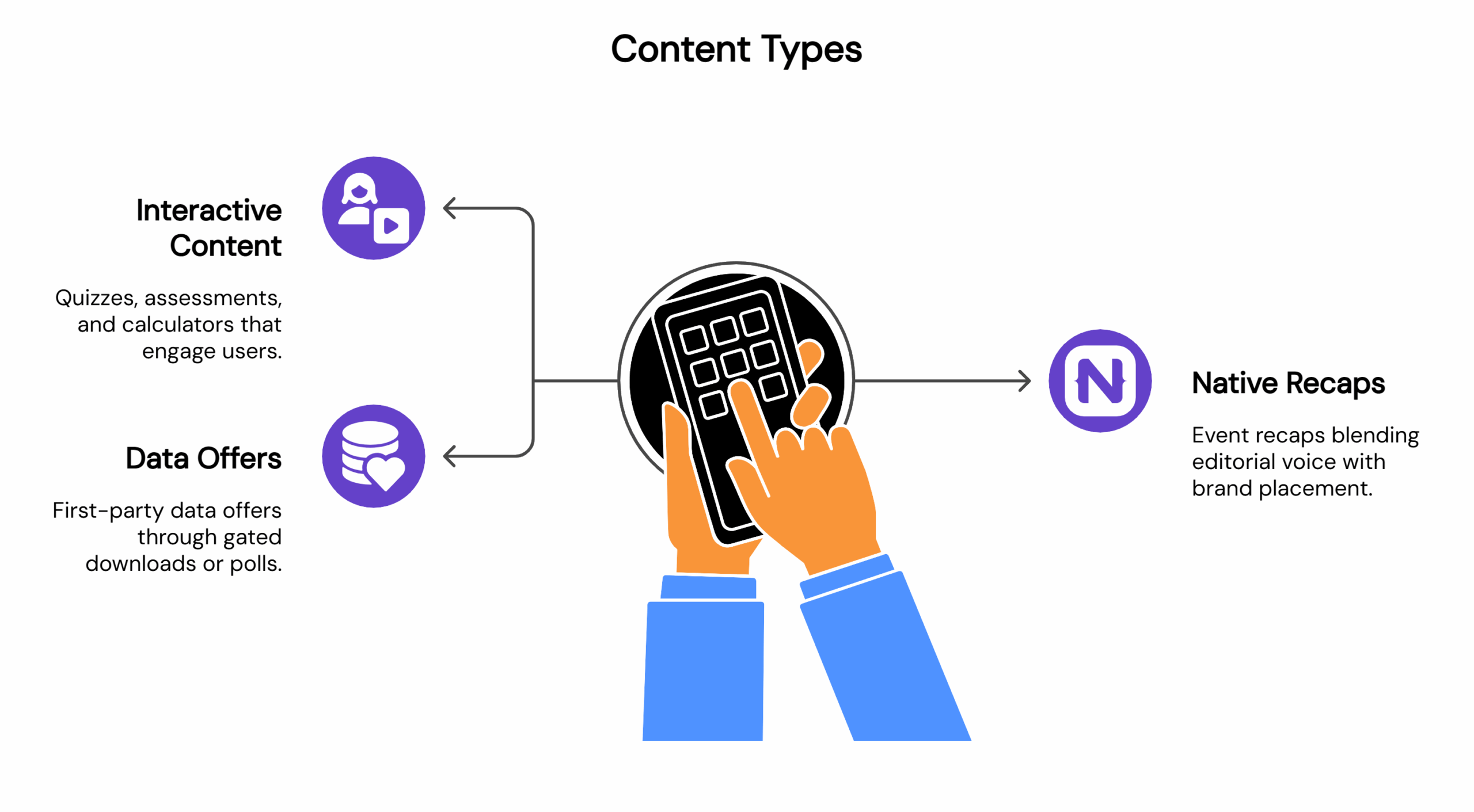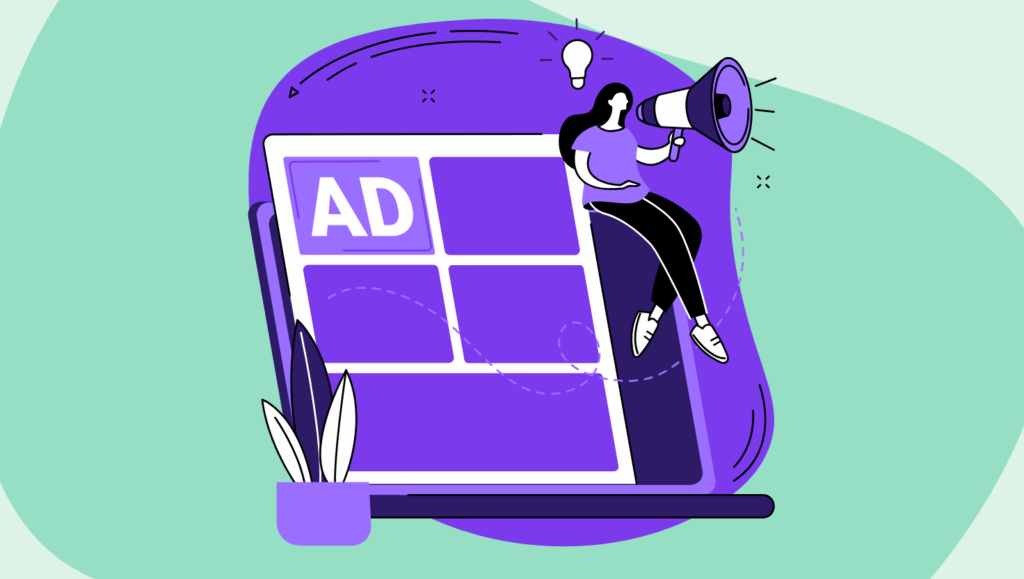Banner ads had a good run. But they’re not aging well (they’re not wine, after all?!)
Most Media Event Companies are seeing diminishing returns on traditional display ads.
The average banner ad click-through rate across industries is 0.35%. That’s barely more than accidental taps. While online banner ads used to be the go-to for monetising content, their performance may have steadily declined with time, overuse, and consumer fatigue.
That said, the real problem isn’t the format itself. It’s how little value it delivers for sponsors in a post-cookie, engagement-driven world.
TL;DR:
- Traditional banner ads are losing steam, with lower engagement and limited personalisation.
- In their place: interactive content, sponsored event recaps, first-party data offers, and dynamic sponsor placements powered by AI agents for media event companies.
- These new-age content monetisation tools help extend sponsor visibility far beyond event days, offering brands measurable ROI and helping media event companies future-proof revenue.
So… what are banner ads being replaced with?
More intelligent, more engaging systems.
Now, media event companies are turning to:
- Sponsored interactive content (quizzes, assessments, calculators)
- Native event recaps that blend editorial voice with brand placement
- First-party data offers through gated downloads or poll responses

These are not banner ads examples (with a modern twist) but performance-driven content formats that serve readers and sponsors alike.
But who has the bandwidth to keep building all this manually?
Not many of us.
This is where AI in publishing starts to matter.
Tools like AI agents for events can now help surface sponsor messages before, during, and after your events, without the brute force.
One example is an Offer Wall Agent, which dynamically showcases sponsor content across your event digital properties, recap emails, or gated post-event content. Unlike banner ads, these aren’t fixed placements. They adapt to timing, reader behavior, and event milestones.
Then there’s the Polling Agent: it doesn’t just ask questions for the sake of it. Instead, it collects first-party data, engages readers, and routes qualified leads back to sponsors in near-real time.
Sponsor renewal is the silent pressure in media-event teams
If you’re running events, you know the drill. You show sponsor logos. You hand over the impression data. But when it’s time for renewal, there’s hesitation.
Wait, that’s not because your event was bad. It’s because their ROI was invisible. So that means you can create a great event, pull off fantastic sessions, and still lose sponsors next year. Why?
Because brands are asking harder questions, they want measurable outcomes, leads, and post-event engagement that outlives the show floor.
That’s where AI-powered content monetisation tools come in, creating multiple sponsor touchpoints across content journeys. By using AI in publishing, media companies are now able to surface sponsor stories within meaningful content, and then prove performance with actual engagement metrics and data capture. Sponsors are also able to get their hands on more useful inventory, with these tools.
Media companies who’ve moved beyond banner ads are seeing…
- Press Gazette saw a 2000£+ added value per campaign by deploying a Polling Agent paired with an Offer Wall Agent, replacing static ads with interactive polls and dynamic sponsor offers embedded within high-performing content.
- Camino Ways increased sponsor click-through rates by 27% after integrating advertiser-led polls into their content experience.
- The Officer boosted advertiser renewals by combining the Polling Agent, Knowledge Agent, and Advertiser Ad-On Agent, helping sponsors capture leads in a way that felt native, contextual, and genuinely useful to readers.
None of these outcomes came from rethinking ‘what are banner ads?’ They came from rethinking how sponsors fit into the attendee’s actual journey.
So, what should replace banner ads in your monetisation strategy?
Here’s a quick checklist:
- Replace static banner placements with AI content monetisation modules
- Build post-event recaps that include interactive sponsor elements
- Use polls and quizzes to collect opt-ins, not just clicks
- Plug sponsor offers contextually inside high-performing content
You don’t need to ditch the display overnight. But it’s time to think less like an ad ops manager and more like a product marketer.
What are AI agents and how do they help media event companies?
In simple terms, AI agents are like assistants for media event companies that never sleep. They plug into your CMS, data tools, and campaign stack to:
- Surface content based on user behavior
- Inject sponsor messages across relevant journeys
- Create and optimise high-performing recap or gated content
Unlike generic automation, AI agents for media event companies are purpose-built for the media workflow. You get scale without sacrificing editorial control.
Wrapping Up
The shift away from online banner ads isn’t a loss. It’s a chance to build better monetisation engines. If you’re looking at how to future-proof your sponsor strategy, the smartest move isn’t just a format refresh; it’s adopting AI agents for media event companies who can do the heavy lifting.
FAQs
Q: What are banner ads and why are they declining?
A: Banner ads are static or dynamic ad placements commonly seen on websites. Their CTR has declined due to ad fatigue, poor targeting, and cookie restrictions.
Q: What are some banner ads examples that still work?
A: Only when placed contextually—e.g., inside a live blog, recap article, or alongside personalised recommendations. Static headers and sidebars no longer perform.
Q: What are AI agents?
A: They’re automated assistants built with specific publishing goals: boosting engagement, optimising placement, and monetising content intelligently.
Q: How does AI content monetisation work?
A: It uses tools like polls, offers, and smart gating to turn engagement into actionable sponsor outcomes. This goes far beyond old-school CPM models.
Q: Is AI in publishing just hype?
A: Not anymore. Media event companies are using AI content monetisation tools are increasing revenue without overworking editorial teams.



15 Comments
Can you be more specific about the content of your article? After reading it, I still have some doubts. Hope you can help me. https://accounts.binance.com/register-person?ref=IXBIAFVY
Your point of view caught my eye and was very interesting. Thanks. I have a question for you. https://accounts.binance.info/zh-TC/register-person?ref=DCKLL1YD
I don’t think the title of your article matches the content lol. Just kidding, mainly because I had some doubts after reading the article. https://accounts.binance.info/da-DK/register?ref=V3MG69RO
Reading your article helped me a lot and I agree with you. But I still have some doubts, can you clarify for me? I’ll keep an eye out for your answers. https://accounts.binance.com/vi/register-person?ref=MFN0EVO1
Your article helped me a lot, is there any more related content? Thanks!
Can you be more specific about the content of your article? After reading it, I still have some doubts. Hope you can help me.
Thank you for your sharing. I am worried that I lack creative ideas. It is your article that makes me full of hope. Thank you. But, I have a question, can you help me? https://www.binance.com/register?ref=IHJUI7TF
Thanks for sharing. I read many of your blog posts, cool, your blog is very good.
Your point of view caught my eye and was very interesting. Thanks. I have a question for you.
Thanks for sharing. I read many of your blog posts, cool, your blog is very good. https://www.binance.info/register?ref=IXBIAFVY
Thanks for sharing. I read many of your blog posts, cool, your blog is very good. https://accounts.binance.info/de-CH/register-person?ref=W0BCQMF1
Your point of view caught my eye and was very interesting. Thanks. I have a question for you. https://www.binance.info/tr/register?ref=MST5ZREF
I don’t think the title of your article matches the content lol. Just kidding, mainly because I had some doubts after reading the article.
Can you be more specific about the content of your article? After reading it, I still have some doubts. Hope you can help me.
Can you be more specific about the content of your article? After reading it, I still have some doubts. Hope you can help me.